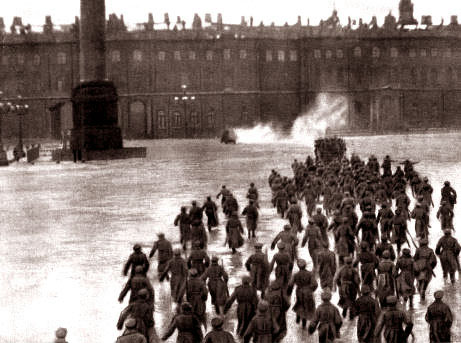Peace in the East: How Russian Radicals Brought an End to WW1
Posted by Pete on 2nd Dec 2020
In the Western World, the Great War ended in 1918. But over the other side of Europe it ended a whole year earlier...
Across the Western world, the Great War is remembered as having come to an end in November 1918.
But on the other side of Europe there was another First World War, and it ended a whole year earlier.
This was the Eastern Front – Russia’s war.

Russians stormed the Winter Palace in Saint Petersburg in November 1917, desperate for an end to the war.
A war ended by the people
A reactionary despot, Tsar Nicholas, had taken Russia to war in 1914 alongside Britain and France.
With its taste for repression, the Tsarist regime in St Petersburg looked sure to face less dissent against the war than its counterparts in London and Paris.
But the power of tyrants is often far less than it seems.
Under the strain of a monstrous war against Germany and its allies, the brittleness of Tsarist power was exposed by the courage of the Russian people.
In February 1917, with their loved ones being killed and maimed at the front, the Romanovs’ long-suffering subjects overthrew them.
The popular hope was for peace, but there was a way to go yet.
The new Provisional Government was intent on continuing the war against Germany while implementing some constitutional reforms at home.
This was not enough. Vladimir Lenin’s Bolsheviks and other left-wing movements demanded an end to the war.
Returning from exile in Spring, Lenin wrote his "April Theses" demanding Russia’s immediate withdrawal from the World War.
In this context of resonant anti-war agitation from the Left, the Provisional Government decided to launch a new offensive against Germany.
It was a disaster – tens of thousands of Russian soldiers were killed.
This was the death knell for the Provisional Government and, with it, the war in Russia.

Ceasefire on the Eastern Front
Anti-war protestors took to the streets of St Petersburg in huge numbers, and soldiers began to mutiny up and down the frontline.
Then came the October Revolution (in November, confusingly).
With the Provisional Government widely despised for continuing the Tsar’s war, Russians stormed the Winter Palace on 7th November 1917.
Lenin then came to power with the simple but immensely popular rallying cry of "Peace and Bread".
His first act was to sign the Decree of Peace in St Petersburg, calling on all belligerent nations to begin peace talks and proposing the immediate withdrawal of Russia from the war.
This began a process which led, on 5th December 1917, to a ceasefire on the Eastern Front.
A full armistice was signed between the new 'Russian Social Federative Socialist Republic' and the Central Powers ten days later.
The lengthy peace talks which followed – at Brest-Litovsk – were a peculiar affair.
Russian peasants, workers, and intellectuals brushed shoulders with German aristocrats and Ottoman grandees. Prince Leopold of Bavaria dined amicably alongside Adolph Abramovich Joffe, a Bolshevik revolutionary.
The terms imposed by the Germans were ruthless in terms of annexations and fines, but the people of Russia got peace at last.
No more Russians would die in the Tsar’s war.
The end of the Great War in the East was certainly different to how it ended in the West, but it was also deeply similar.
The Russian people overthrew the Tsar and thrust Lenin forward out of a desire for peace, a desire to stop having their sons, fathers, and friends killed in a senseless and irrelevant war.
Such a desire existed in the hearts of ordinary citizens and soldiers all over the world.
It was manifest in the trench poetry of Wilfred Owen and the battlefield mutinies which swept the French armies in 1917.
It could be seen in the anti-war activism of Eugene Debs and Emma Goldman in the US, and in the German Revolution of November 1918.

It was even there in the wonderful, spontaneous Christmas Truce of 1914 – perhaps the first mutiny of the Great War!
Peace needn’t come at the whim of the great and powerful.
It is the people who pay for war with their lives and it has often been the people who have, by protest and defiance, forced the advent of peace.
